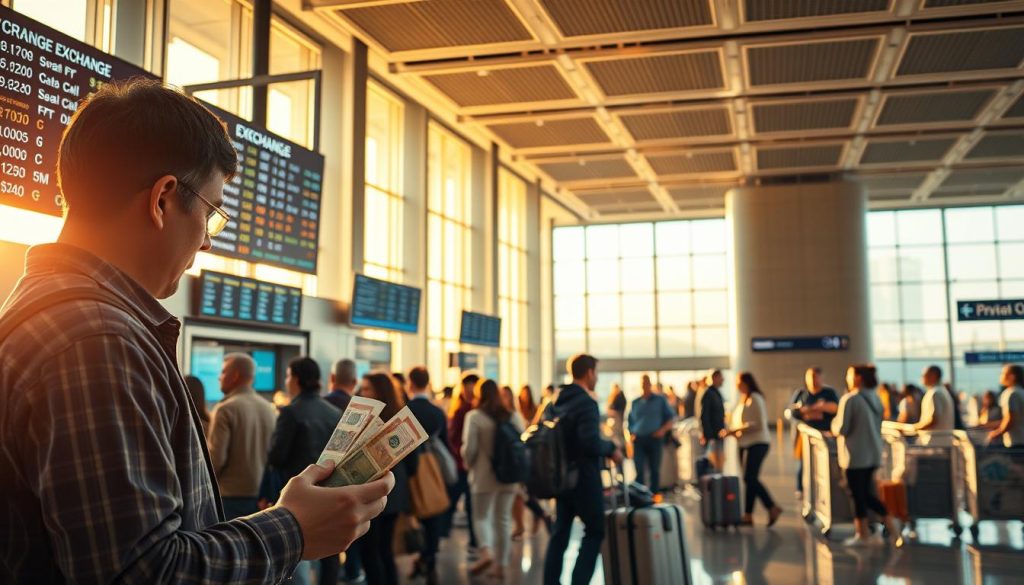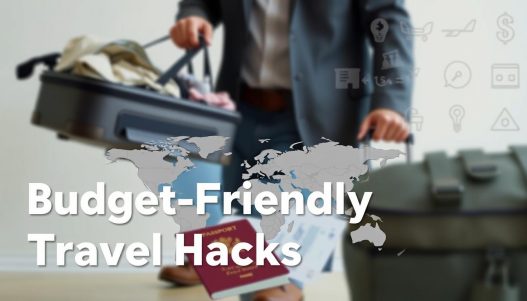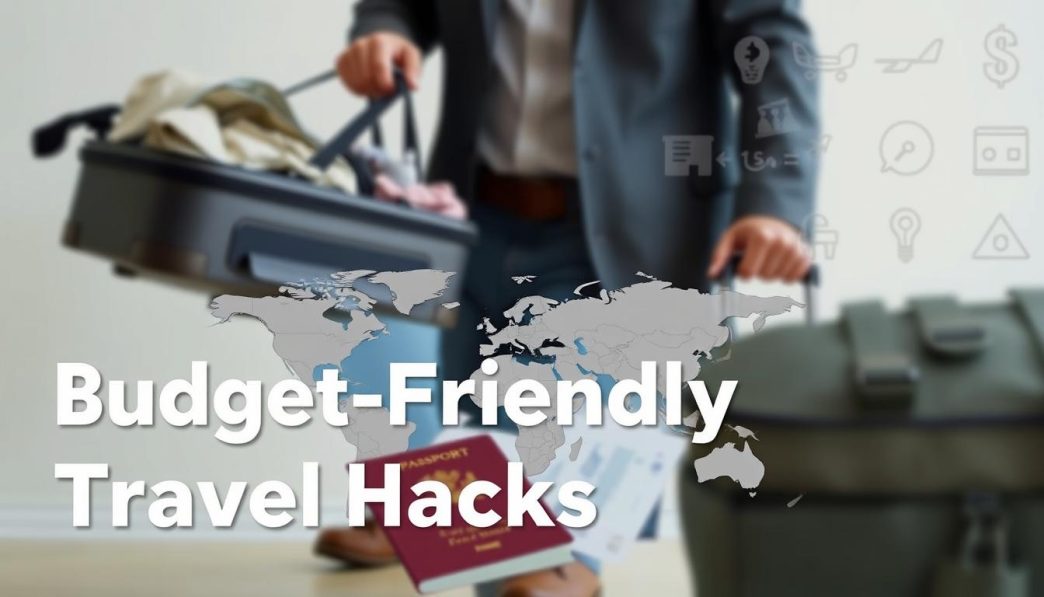Traveling can be pricey, but you can save money without losing out on a great trip.
Most of our travel budget goes to getting there, eating, and where we stay, says ValuePenguin.
In this article, we’ll look at budget-friendly travel hacks to make your trip cheaper.
Key Takeaways
- Find affordable flights and accommodations
- Save on food by planning your meals
- Explore free or low-cost activities at your destination
- Use travel apps to navigate and find deals
- Consider off-season travel for better deals
The Art of Travel Planning on a Budget
Learning to plan your trips on a budget can save you a lot of money. It’s all about knowing when to book flights and hotels. Also, using price comparison tools and setting up price alerts are key.
When to Book for the Best Deals
Booking at the right time is key to saving money. NerdWallet says knowing common money mistakes can help you save. Booking flights and hotels at the best time can really cut down your costs.
Flight Booking Windows by Destination Type
Each destination has its own best booking time. For example:
- Domestic flights: Book 1-3 months in advance
- International flights: Book 2-8 months in advance
- Popular destinations: Book earlier, often 3-6 months in advance
Hotel Rate Fluctuations Throughout the Week
Hotel rates change based on the day of the week. Studies show booking hotels on Sundays or Tuesdays can get you better rates.
Using Price Comparison Tools Effectively
Price comparison tools are vital for finding great deals. Sites like Skyscanner and Kayak let you compare prices from different airlines, hotels, and dates.
Setting Up Price Alerts for Your Dream Destinations
Setting up price alerts can help you get the best deals. Many travel sites, including Google Flights and Hotels.com, offer alerts. They notify you when prices go down.
By using these tips, you can cut down your travel costs. This way, you can enjoy a more affordable trip.
Budget-Friendly Travel Hacks: Saving Money on Your Next Trip
Traveling on a budget is more than just finding cheap flights. It’s about managing your expenses smartly. With a few simple hacks, you can cut down costs without sacrificing your trip’s quality.
The 50-30-20 Travel Budget Rule
The 50-30-20 rule is a simple way to manage your travel budget. Spend 50% on necessary costs like flights and hotels. Use 30% for fun activities like dining out or exploring. And save 20% for unexpected costs. This rule keeps your trip enjoyable and within budget.
Creating a Realistic Travel Fund
For a stress-free trip, start with a realistic travel fund. First, figure out how much you need for your trip. Then, plan a timeline to save that amount.
Automated Savings Strategies
Automate your savings by setting up regular transfers to your travel fund. This way, saving becomes automatic, and your fund grows steadily.
Travel-Specific Side Hustles
Boost your savings with travel side hustles. Options include house sitting, pet sitting, or freelance work. Choose jobs that fit your schedule and can be done remotely.
Apps That Help Track Your Travel Spending
Travel expense tracking apps can be a big help. Apps like Trail Wallet or Mint let you monitor your spending in real-time. They help you stay on budget and offer insights into your spending.
- Trail Wallet: A user-friendly app for tracking expenses on the go.
- Mint: Offers comprehensive financial tracking, including travel expenses.
By using these travel hacks, you can enjoy your trip without worrying about money. Remember, successful budget travel is all about planning and discipline.
Finding Affordable Flights Without Sacrificing Comfort
Understanding airline pricing and rewards programs is key to finding cheap flights. By using the right strategies, travelers can cut down their travel costs.
Best Days and Times to Book Flights
Booking flights at the right time can save a lot of money. Studies show that booking on certain days and times can lead to cheaper fares. For example, Tuesdays and Wednesdays are often the best days to book flights because prices tend to be lower mid-week.
Hidden Airline Fees to Watch Out For
Airline fees can quickly add up, making a cheap flight expensive. Baggage fees, seat selection fees, and in-flight amenities are common charges. Knowing about these fees helps travelers make better choices.
Leveraging Airline Rewards Programs
Airline rewards programs are great for frequent travelers. By understanding how to use credit card points and airline alliance benefits, travelers can save on flights.
Credit Card Points Maximization
Credit card points can be earned by choosing the right cards. Using credit cards for daily expenses and paying off the balance in full can help earn points fast.
Airline Alliance Benefits
Airline alliances offer benefits like reciprocal frequent flyer miles and lounge access. Understanding these can make travel better and save money.
By being smart about booking flights, knowing about hidden fees, and using rewards programs, travelers can find affordable flights without giving up comfort.
Alternative Transportation Options That Save Money
Looking into budget travel means exploring alternative transportation. This can greatly reduce costs. Transportation costs make up almost 44% of travel expenses. So, finding ways to save here is key.
When to Choose Trains Over Planes
Trains are a cozy and scenic choice over flying. They’re often cheaper for short trips. Plus, you get more room to move around.
Bus Travel: The Unsung Hero of Budget Trips
Bus travel is another budget-friendly option. Companies like Greyhound and Megabus have good prices. It might take longer, but you see the countryside and meet people.
Ridesharing and Car Rental Alternatives
Ridesharing and car rentals are handy, but there are better choices. Ridesharing is great for short rides or group trips.
Peer-to-Peer Car Sharing Services
Services like Turo let you rent cars from locals. It’s cheaper and more personal than regular car rentals.
Budget Accommodation Strategies Beyond Hotels
Travelers on a budget can save a lot by looking beyond hotels. NerdWallet says lodging is about a quarter of trip costs for Americans. Options like hostels and vacation rentals can cut expenses.
Hostels: Not Just for College Students
Hostels are not just for college students anymore. They offer dorms and private rooms at good prices. You’ll find free Wi-Fi, kitchens, and social events, appealing to all ages.
Private Rooms vs. Dorms: Cost-Benefit Analysis
Choosing between private rooms and dorms is key. Private rooms are pricier but offer more comfort. Dorms are cheaper and let you meet others. It’s about what you value more: privacy or saving money.
Vacation Rentals vs. Traditional Hotels
Vacation rentals are gaining fans for their space and extras. They’re great for longer stays or groups. Airbnb and VRBO have many options, from apartments to houses.
House Sitting and Home Exchange Opportunities
House sitting and home exchange offer free stays in exchange for home care. They save money and offer a cultural dive.
Loyalty Programs Worth Joining
Joining loyalty programs can help if you often stay in hotels or use certain services. They offer rewards and discounts for regulars, making travel cheaper.
“The right accommodation can make or break a trip. Exploring budget-friendly options can lead to a more enjoyable and stress-free travel experience.”
Eating Well Without Breaking the Bank
Eating on a budget doesn’t mean you have to give up flavor or authenticity. Food and alcohol make up about 27% of travel costs. This makes saving money in this area very important.

Finding Authentic Local Food at Reasonable Prices
To really experience local culture, eat where locals do. Street food stalls and local eateries offer real dishes at lower prices than tourist spots. As Anthony Bourdain said, “Your body is not a temple, it’s an amusement park. Enjoy the ride.”
“The discovery of a new dish does more for human happiness than the discovery of a new star.” – Jean Anthelme Brillat-Savarin
Self-Catering: When and How to Cook While Traveling
Self-catering is a smart way to cut costs, if you’re staying put. Choose places with kitchens and cook some meals. You can find fresh local ingredients at markets or stores, adding to your cultural experience.
Street Food Safety Tips
Street food is tasty and authentic, but safety first. Choose stalls with lots of customers and avoid anything that looks bad. Follow the locals and eat where they do.
Restaurant Timing Strategies for Better Deals
Eating at off-peak times can save you money. Try lunch instead of dinner for specials and discounts. Look for happy hour or early bird deals too.
Free and Low-Cost Activities at Popular Destinations
Exploring popular spots doesn’t have to cost a lot. There are many free and low-cost activities. You can enjoy cultural experiences or outdoor adventures without spending much.
Museum Free Days and City Passes
Many museums offer free entry on specific days. Visiting on these days can save you a lot. City passes also offer discounts to several attractions, which is great for seeing many places.
Walking Tours and Self-Guided Adventures
Walking tours are a great way to see a new city. They give you insights into history, culture, and hidden spots. Many cities have free walking tours, and some offer self-guided tours for you to do at your pace.
Nature Excursions That Don’t Cost a Dime
Nature enthusiasts will find plenty of free outdoor activities. You can hike, visit public parks, or enjoy beaches without spending money.
Local Events and Festivals
Joining local events and festivals is a fun way to dive into the culture. Many of these are free or low-cost, offering a memorable experience without the high cost.
By using these free and low-cost activities, you can fully enjoy your trip without spending too much. According to NerdWallet, planning ahead can help save money on activities. This makes your travel both fun and affordable.
Smart Packing to Avoid Unnecessary Expenses
Learning to pack smart can cut down on travel costs. By choosing what you pack carefully, you can dodge many unnecessary expenses. This includes the cost of items and fees for luggage.
Essential Items That Save Money on the Road
Buying a few essential travel items can save you money. For example, a refillable water bottle cuts down on bottled water costs.
A portable charger also helps avoid expensive charging services.
Packing Light to Avoid Baggage Fees
According to The Points Guy, packing light can save you from baggage fees. These fees can add up fast.
Airlines charge extra for checked bags and sometimes for carry-ons too. Packing only the essentials makes travel cheaper.
Multi-Purpose Travel Gear Worth Investing In
Investing in multi-purpose travel gear is another smart move.
Items like a sarong or a quick-dry towel can do many things. This means you need to pack less.
Technology That Pays for Itself
A portable Wi-Fi hotspot is a smart choice. It’s cheaper than international data roaming charges.
Clothing That Works in Multiple Settings
Packing clothes that can be worn in different places is smart. It also means you need less luggage.
This way, you can adapt to different weather conditions without needing to pack more.
Navigating Currency Exchange and Foreign Transaction Fees
Traveling abroad can be expensive if you don’t know about currency exchange and fees. Knowing these costs helps you plan your budget better.
Best Credit Cards for International Travel
Choosing the right credit card can save you money on foreign transaction fees. Look for cards with no foreign transaction fees. Cards like Chase Sapphire Preferred and Capital One Venture are great for travelers.
ATM Strategies to Minimize Fees
Withdrawing cash from ATMs is common, but it can cost you. Use ATMs from your bank or cards that cover ATM fees. This way, you avoid extra charges.

Digital Payment Options for Travelers
Digital payments like PayPal, Apple Pay, and Google Pay can be cheaper than credit cards. They’re worth considering for your next trip.
When to Exchange Currency (and When Not To)
Exchanging currency before you go might seem easy, but it’s not always the best deal. Compare rates and think about using an ATM or credit card instead. Some currencies are better to exchange before you leave, so do your research.
| Payment Method | Foreign Transaction Fees | Currency Exchange Rate |
|---|---|---|
| Credit Card A | 0% | Competitive |
| Credit Card B | 3% | Less Competitive |
| Debit Card | Variable | Variable |
“The key to saving money on international transactions is being aware of all the potential fees involved.”
Travel Insurance: When to Splurge and When to Skip
Travel insurance is key when planning a trip. It offers financial protection against unexpected events. Seven Corners says it can safeguard your investment.
Understanding What’s Already Covered
Before buying travel insurance, check what your current policies cover. This includes health insurance or credit card benefits. Knowing this can help you avoid paying for the same coverage twice and save money.
Budget-Friendly Insurance Options
If you’re on a tight budget, there are cheaper travel insurance options. Comparing different providers can help you find the best deal. Look for policies with flexible coverage and low deductibles.
Claims Process Tips
Understanding the claims process is crucial. Keeping detailed records and knowing what your provider needs can make filing a claim easier. It’s also important to document everything related to your claim.
Destination-Specific Insurance Considerations
Each destination has its own risks. Knowing these risks and choosing the right insurance can give you peace of mind. For instance, if you’re going to an area prone to natural disasters, make sure your policy covers it.
Off-Season Travel: Maximizing Value Year-Round
Traveling off-season lets you see places without the crowds and high costs. ValuePenguin says it can save you money on flights and hotels. Knowing the shoulder season and weather can also help a lot.
Shoulder Season Benefits by Destination
The shoulder season is the best time to visit. It’s between the peak and off-peak times. Here are some benefits by destination:
European Destinations
- Visit Paris in April or September for fewer crowds and nice weather.
- Explore Italy’s countryside in May or October for good weather and fewer tourists.
Tropical Getaways
- Go to Hawaii in April-May or September-November for lower prices and nice weather.
- Consider the Caribbean in April-May or November-December for a calm vibe.
Major Cities
- New York City is less crowded in January-February, with lower hotel rates.
- Visit Tokyo in April for cherry blossoms or September for autumn weather.
Weather Considerations for Off-Peak Travel
Knowing the weather at your destination is key for off-peak travel. Some places have extreme weather at certain times. Researching the weather can help you plan better.
Negotiating Better Rates During Low Season
In the off-season, service providers often offer better deals. Here are some tips:
- Be flexible with your travel dates for the best deals.
- Research thoroughly to know the off-season prices.
- Negotiate with hotels or tour operators for discounts.
By understanding the shoulder season and weather, you can get more value from your travel all year.
Conclusion: Implementing Your Budget Travel Strategy
By using a budget travel plan, you can cut down your travel costs. NerdWallet says a good plan can save you money on trips. This article has given you many ways to make your travel cheaper.
To save money, try the 50-30-20 travel budget rule. Use price comparison tools to find deals. Also, use airline rewards and choose affordable places to stay. These steps can help you enjoy your trip without spending too much.
Now you know how to travel on a budget. It’s time to start planning your next trip. With some creativity and smart planning, you can have a great and affordable travel experience.






